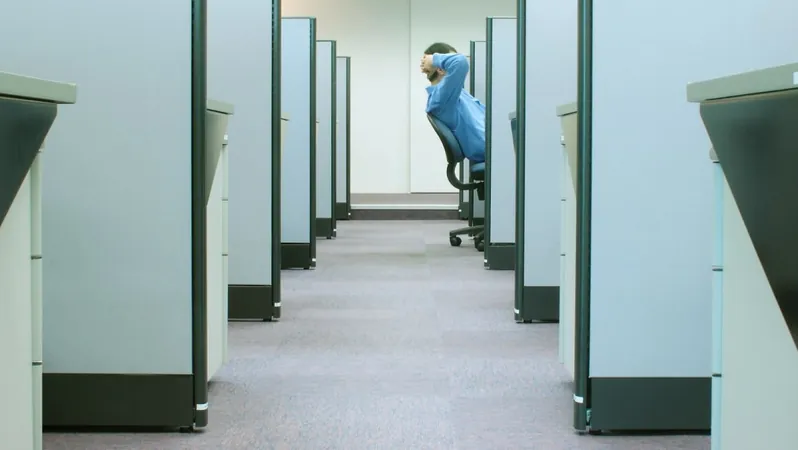
Is the Office a Thing of the Past? Why Teleworkers Are Rejecting the Return to Corporate Life!
2025-01-19
Author: Yu
Introduction
In a world forever changed by the COVID-19 pandemic, many American teleworkers are adamant about not returning to the traditional office environment—a sentiment voice-echoed by Curtis Sparrer, a passionate advocate for remote work. For him, the office is akin to a "corporate jail," a space that symbolizes a lack of trust and autonomy in the workplace.
The Intensifying Debate Around Telework
The debate around telework has intensified and is making waves in the political arena. Notably, the incoming Trump administration's Department of Government Efficiency (DOGE), led by notable figures Elon Musk and Vivek Ramaswamy, plans to enforce a complete ban on remote work for federal employees. Such a move raises eyebrows among employees and advocates who argue that productivity and job satisfaction can be significantly undermined by forcing individuals back to the office.
A Culture of Monitoring
Sparrer highlights how the traditional office creates an environment where employees feel monitored rather than trusted. "You need to see people there physically to ensure they are doing their work," he notes, underlining the outdated nature of this thinking in the modern workplace.
Corporate Pushback Against Remote Work
As hybrid work gained traction, many companies have attempted to embrace this flexibility. However, several major corporations, such as Amazon and JPMorgan Chase, have abandoned this approach, mandating a return to full-time office attendance. Amazon, for example, demands that its engineers and administrative staff return to the office five days a week, a decision that has sparked outrage; a staggering 90% of employees expressed dissatisfaction with this policy in a recent survey. Some have even reported avoiding job opportunities at the tech giant due to this mandate. Critics suggest that this could be a sly downsizing strategy, potentially putting Amazon at risk of losing its top talent.
Similarly, JPMorgan Chase announced the end of telework, only to face backlash. Employees expressed their concerns so vocally that the bank had to close an internal discussion platform. Acknowledging these issues, JPMorgan’s CFO Jeremy Barnum stated, "We are very much not hoping for attrition as a function of return to office."
The Benefits of Remote Work
Sparrer regrets these decisions made by big firms, expressing disappointment over the push to reverse the progress achieved in remote work culture. His own experience founding Bospar in 2015 highlighted the benefits of remote work: cultivating a diverse talent pool without geographical limitations and reducing inequality inherent in office settings. He pointed out that "the typical office building is a polluting nightmare," emphasizing the environmental benefits of telecommuting as well—where remote workers tend to cook at home instead of relying on deliveries and engage in more sustainable practices.
Statistical Trends in Telework
According to the "Flex Index" study by IT solutions firm Scoop, the tide seems to be shifting. By the end of 2024, roughly one-third of U.S. companies are expected to require full-time in-office presence while 38% will maintain a hybrid model, and less than 30% will offer complete freedom of choice to employees.
Success Stories in Remote Work
An exemplary case in the transition to telework is healthcare software provider DrFirst, which shifted to permanent remote operations in 2023 based on employee input. Their results speak volumes: over 85% of employees reported improved well-being and reduced stress. The company has managed to maintain a strong culture through online community-building initiatives and regular performance check-ins, proving that productivity can thrive outside the confines of a cubicle.
Employees like Heather Happe, a 14-year veteran at DrFirst, openly cherish the elimination of rush-hour traffic. “I’ve learned to set boundaries,” she explains, reveling in the newfound time for family, pets, and personal interests.
Conclusion
The workplace landscape is evolving, and it appears that many teleworkers are not going back willingly. As conversations around remote work continue to heat up, one fact is clear: the traditional office setting may soon become an antiquated concept, as professionals choose flexibility over the chains of corporate life. The question remains—will companies adapt, or will they face a future where talent flees corporate constraints?




 Brasil (PT)
Brasil (PT)
 Canada (EN)
Canada (EN)
 Chile (ES)
Chile (ES)
 Česko (CS)
Česko (CS)
 대한민국 (KO)
대한민국 (KO)
 España (ES)
España (ES)
 France (FR)
France (FR)
 Hong Kong (EN)
Hong Kong (EN)
 Italia (IT)
Italia (IT)
 日本 (JA)
日本 (JA)
 Magyarország (HU)
Magyarország (HU)
 Norge (NO)
Norge (NO)
 Polska (PL)
Polska (PL)
 Schweiz (DE)
Schweiz (DE)
 Singapore (EN)
Singapore (EN)
 Sverige (SV)
Sverige (SV)
 Suomi (FI)
Suomi (FI)
 Türkiye (TR)
Türkiye (TR)
 الإمارات العربية المتحدة (AR)
الإمارات العربية المتحدة (AR)